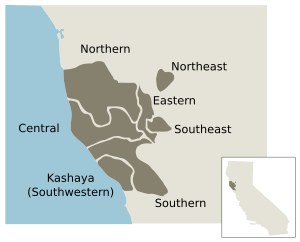Central Pomo language facts for kids
Quick facts for kids Central Pomo |
|
|---|---|
| Native to | United States |
| Region | Northern California |
| Extinct | by 2000e23 |
| Language family |
Hokan?
|

The seven Pomoan languages with an indication of their pre-contact distribution within California
|
|
Central Pomo was a Pomoan language spoken by Native American people in Northern California. Sadly, it became extinct around the year 2000.
Before Europeans arrived, it's thought that about 8,000 people spoke all the Pomoan languages together. This number comes from an American anthropologist named Alfred Kroeber.
Where Central Pomo Was Spoken
The Central Pomo language was traditionally spoken in a large area of Northern California. This area stretched from the Russian River southwest of Clear Lake all the way to the Pacific coast.
People who spoke Central Pomo lived in several places. These included settlements along the Russian River, such as in the southern Ukiah Valley and Hopland Valley. They also lived closer to the coast in places like Manchester, Point Arena, and near the mouth of the Gualala River. In the areas between the river and the coast, settlements were found around Yorkville and in Anderson Valley.
Sounds of Central Pomo
Every language has its own unique set of sounds. Central Pomo had many consonant sounds. It was similar to the related Southern Pomo language, but with some interesting differences.
For example, Central Pomo could tell the difference between sounds made further back in the throat (called velar and uvular sounds). It also didn't have a specific "ts" sound that some other languages have. Unlike Southern Pomo, Central Pomo didn't use long, drawn-out sounds for its root consonants.
Learning More About Central Pomo
Even though Central Pomo is no longer spoken, people are still working to learn about it. As of 2013, a special project was underway. This project is transcribing, or writing down, materials about Central Pomo that were collected by a researcher named J.P. Harrington. This work helps us understand more about this important language and the people who spoke it.
 | Claudette Colvin |
 | Myrlie Evers-Williams |
 | Alberta Odell Jones |

